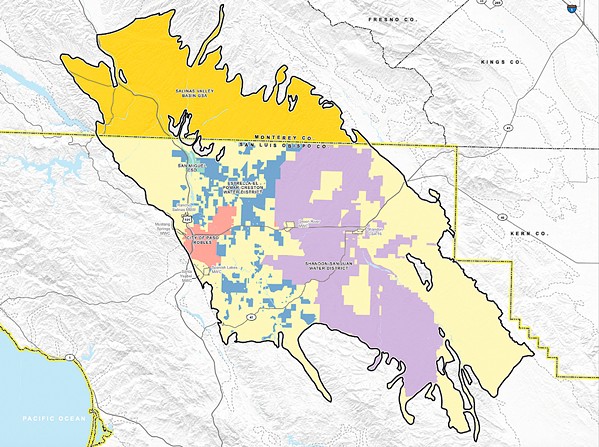In a vote that invoked the long-running clash between commercial agriculture and rural residents in Paso Robles, the San Luis Obispo County Board of Supervisors relinquished some of its Paso groundwater basin governance authority to a water district on June 6.
The 3-2 vote gave the Estrella-El Pomar-Creston (EPC) Water District a seat and a 29 percent vote share on the Paso Basin Cooperative Committee, the board tasked with implementing the policies and projects to solve the aquifer's overdraft.

- Map Courtesy Of SLO County
- PATCHWORK GOVERNANCE After a June 6 vote by the SLO County Board of Supervisors, the Estrella-El Pomar-Creston Water District (in blue) will get a seat at the table in Paso Robles Groundwater Basin policy decisions.
By allowing the EPC Water District to join, the county essentially ceded control over a geographic territory of the basin whose owners have voluntarily joined the EPC district. The move will reduce the county's vote share on the committee, as well as its funding share, from 62 percent to 32 percent.
"For me, this vote is not about politics. This vote is about what's best for managing the basin," 3rd District Supervisor Dawn Ortiz-Legg said in support of the move. "It's very important that everybody has a voice. We need everybody to be participating."
Opponents, like 5th District Supervisor Debbie Arnold, felt it imperative for the county to retain its power on the committee and to prevent commercial ag interests from gaining more influence on basin policy.
"We know what the [basin] property owners want, and they don't want their property to be overseen by water districts that are actually controlled by large investors that don't live in the community," Arnold said.
The EPC Water District—which has about 200 landowner members on the west side of the basin—submitted a formal request to the county in February to join the committee. Its leadership spoke during public comment on June 6 to urge the Board of Supervisors to support their participation.
"I just want to state that we want to be a meaningful partner in solving our overdraft problem," EPC Vice President Hilary Graves told the board. "Over the last five years, I think we've done a really good job of demonstrating our ability to be a good partner."
Graves and other district members touted their work thus far helping the county progress toward complying with the state's Sustainable Groundwater Management Act (SGMA), like doubling the size of the basin monitoring well network.
Members said that inviting the district onto the committee was bringing basin governance closer to the people.
"In my judgment, any governance is most effective when the level of administration is both geographically localized and has carefully focused powers," landowner Michael Baugh said. "The EPC Water District is both. It's local and it's directed toward a single goal: the health and longevity of the Paso Robles water basin."
In 2018, the EPC made the same request to the county to join the committee, but a previous Board of Supervisors majority denied it. This time around, the board's vote went in its favor.
"I have supported this for quite a long time," 2nd District Supervisor Bruce Gibson said, calling it "consistent with the strategy and the policy laid out by the Board of Supervisors."
Fourth District Supervisor Jimmy Paulding said his vote to support the EPC reflected his "big tent philosophy" of bringing stakeholders together. The EPC district will join the county, the city of Paso, the San Miguel CSD, and the Shandon-San Juan Water District at the table.
"It's about solutions," Paulding said. "The reality is over the last 10 years, we haven't had that approach and we haven't been delivering solutions."
Paso area residents who spoke against the EPC district cited a 2016 election in which 76 percent of basin voters rejected the formation of one water district to govern the entire Paso basin. Templeton resident and former 2nd District supervisor candidate Bruce Jones boiled down the decision to either siding with locals or special interests.
"This policy change essentially determines whether the Paso basin water policy will be controlled by a small special interest group of large water banking investors, or controlled by you, the board," Jones said.
Echoing that, 1st District Supervisor John Peschong said that the majority of his constituents "do not want this to happen." He noted that the San Miguel CSD's board submitted a letter in opposition to the EPC's participation.
"I think what we're doing is wrong. I do not believe that this benefits any of the small family farms in the basin," Peschong said.
Pointing the finger back at the Board of Supervisors, EPC Water District member Matt Merrill asserted that it's the county that's historically failed Paso Robles farmers by not pursuing other water solutions.
"It's a crisis that was basically created by the supervisors not taking action and sitting on their hands for way too long," Merrill said. "In the end, we have to look toward the future, and blaming and pointing fingers at everybody is just a waste of time. We need to move forward." Δ
Comments